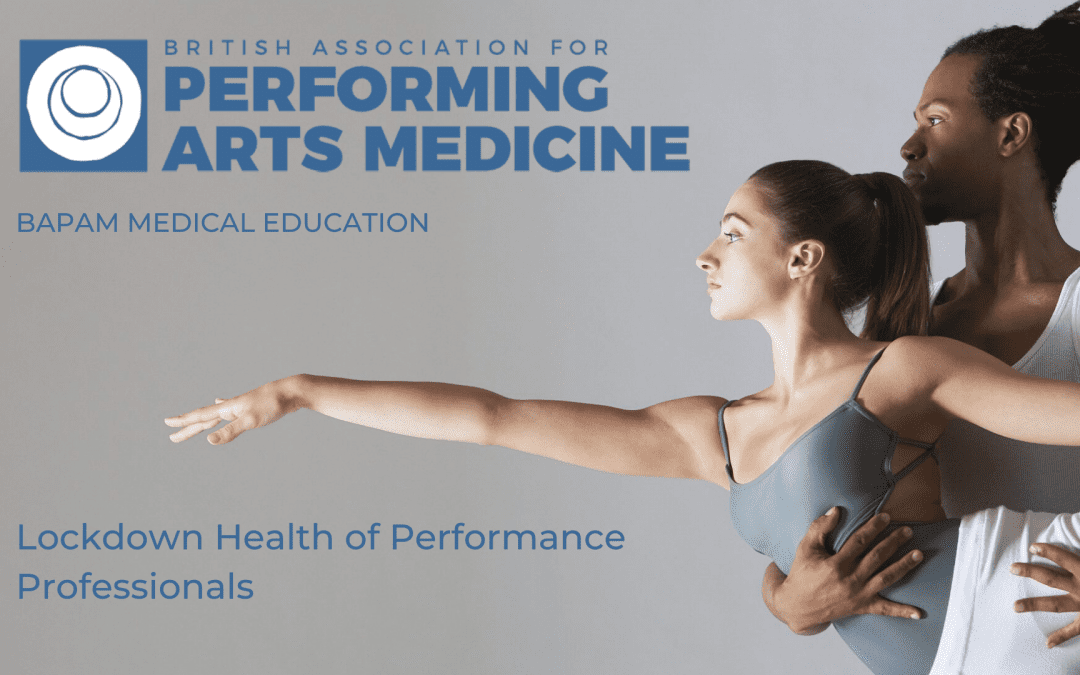A vital element of our mission at BAPAM is supporting the development of clinical standards for healthcare in the arts, and sharing expertise with clinicians, healthcare and education professionals who support performers and creative practitioners.
Although we miss the opportunity to gather in person at our Performing Arts Medicine Training Days, our new series of focused online CPD sessions benefits our community by enabling wider access to a flexible ongoing programme.
The COVID-19 pandemic has had a hugely disruptive impact on everyone who works or studies in the performing arts, and we held our first session in October exploring perspectives on the health of performance professionals during lockdown. It was chaired by Dr Hara Trouli, Musculoskeletal Doctor and Course Lead for UCL’s ground-breaking Performing Arts Medicine MSc.
BAPAM CEO, Claire Cordeaux, spoke of our experience of patients’ struggles with loss of work and worries about sustaining their career, impacts on creativity and identity, and feelings of demotivation. Our case mix changed – fewer work-related musculoskeletal problems, and a considerable increase in people presenting with mental health problems (up from 15% to 26% of total cases). Of these, around a third of people presented with moderate to severe mental health problems (previously 12%). We’ve also seen an increase in the proportion of performance professionals contacting us with other kinds of complex ongoing health needs, some of whom have been unable to access NHS services temporarily closed due to the pandemic. In vocal health care, we provided an interim service providing advice from specialist Vocal Rehabilitation Coaches while patients waited for diagnostic assessments at temporarily closed Voice Clinics.
We were determined to adapt our clinical and health education services to support patients and the wider performing arts community through lockdown. We switched to remote consultations (our next CPD session takes a deep dive into the pros and cons of remote performing arts medicine) and introduced a new online peer support initiative in the form of our Community Drop-in Sessions. BAPAM GP, Dr Pippa Wheble, gave the next talk on these peer support sessions, which she facilitated weekly, with guest experts covering topics such as mental skills training, motivation and self-care, as well as a session sharing Pippa’s own expertise in breathing techniques. Participants valued connecting with peers and the opportunity to shift perspective from career stress to a focus on healthy creative practice skills for lockdown and beyond. The sessions are good reminders of my ‘worth’ and ‘value’ and give practical tips in improving a creative life.
Dr Finola Ryan, Specialist Registrar in Occupational Medicine and Honorary Performing Arts Medicine Lecturer at UCL, spoke about the BAPAM risk assessment guidance for freelance musicians as they return to work during the pandemic.
We were honoured to welcome Lucinda Halstead M.D., Otolaryngologist and President of the Performing Arts Medicine Association (PAMA) in America, to close the session. It was fascinating to hear about the measures she had taken in order to carry on working safely in her voice clinic during the pandemic, and the findings of recent research into aerosol spray and COVID-19 transmission for specific instruments. She explained how she had learned from this to increase safety in her own clinical practice.
We thoroughly enjoyed the wider discussion that followed each presentation and it was great to get our CPD programme underway. Sessions continue on the last Wednesday of every month (except December) from 19:00 GMT. We explore key topics in current performing arts medicine practice and share unique insights into performance health and wellbeing. The approach is multidisciplinary: physiological and psychological care, preventing as well as treating problems, supporting healthy and sustainable creative practice.
Find out more about future sessions and book your place here

